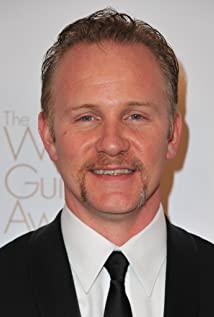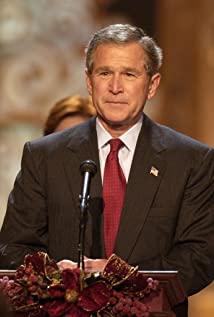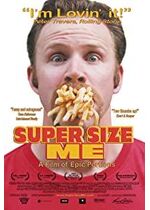-
Morgan Spurlock: There is a big, knappy hair in my sundae.
-
Morgan Spurlock: I consumed over thirty pounds of sugar. That's an average of a pound of sugar a day.
-
[last lines]
Morgan Spurlock: [voiceover] Still, the impact of this lawsuit is being seen far and wide. School districts in New York, Texas, and San Francisco have banned sugary soft drinks in schools. And all-natural healthy options are popping up everywhere. McDonald's joined right in, sponsoring events that showed how health-conscious they've become, and creating a new line of premium salads. At the same time, however, they also masterminded one of their fattest sandwiches to date: the McGriddle. A pancake-wrapped creation that won my heart in Texas, but can pack as much fat as a Big Mac, and have more sugar than a pack of McDonaldland cookies. In fact, their new premium ranch chicken salad with dressing delivers more calories than a Big Mac and 51 grams of fat, 79% of your daily fat intake. Over the course of my McDiet, I consumed 30 pounds of sugar from their food. That's a pound a day. On top of that, I also took in 12 pounds of fat. Now, I know what you're saying. You're saying nobody's supposed to eat this food three times a day. No wonder all this stuff happened to you. But the scary part is: there are people who eat this food regularly. Some people even eat it every day. So, while my experiment may have been a little extreme, it's not that crazy. But here is a crazy idea: Why not do away with your Super Size options? Who needs 42 ounces of Coke? A half pound of fries? And why not give me a choice besides french fries or french fries? That would be a great start. But why should these companies want to change? Their loyalty isn't to you, it's to the stockholders. The bottom line: They're a business, no matter what they say. And by selling you unhealthy food, they make millions. And no company wants to stop doing that. If this ever-growing paradigm is going to shift, it's up to you. But if you decide to keep living this way, go ahead. Over time, you may find yourself getting as sick as I did. And you may wind up here
[emergency room]
Morgan Spurlock: or here
[cemetery]
Morgan Spurlock: I guess the big question is, who do you want to see go first? You? Or them?
-
Morgan Spurlock: This is the best part of the day, when I get to be fat, on the bed, with my quart of Coke.
-
[first lines]
Children: A Pizza Hut! A Pizza Hut! Kentucky Fried Chicken and a Pizza Hut! A Pizza Hut! A Pizza Hut! Kentucky Fried Chicken and a Pizza Hut! McDonalds! McDonalds! Kentucky Fried Chicken and a Pizza Hut! McDonalds! McDonalds! Kentucky Fried Chicken and a Pizza Hut! I like food! I like food! Kentucky Fried Chicken and a Pizza Hut! You like food! You like food! Kentucky Fried Chicken and a Pizza Hut!
-
Morgan Spurlock: What is this a picture of?
Child: I don't know. George W. Bush?
[Morgan shows the camera that it is actually a picture of Jesus]
-
Morgan Spurlock: [to kids] I'm gonna show you some pictures and I want you to tell me who they are.
Children: OK.
Morgan Spurlock: [Showing a picture of George Washington] Who's that?
Child: George Washington?
Children: Good. Who was he?
Children: He was the 4th president. He freed the slaves. He could never tell a lie.
Morgan Spurlock: [shows picture that we can't see] Who's that?
Child: George W. Bush?
Morgan Spurlock: No. That's a good guess though.
[Shows picture to the camera, and we see that it's a picture of Jesus]
Morgan Spurlock: Who is this?
[shows a picture of the Wendy's girl]
Child: Wendy!
Morgan Spurlock: Nice!
Morgan Spurlock: Who's that?
[shows picture of Ronald McDonald]
Child: McDonald, Ronald McDonald.
Child: McDonald!
Morgan Spurlock: What does he do?
Child: He helps people at the cash register.
Child: He works at McDonald's. I love the pancakes and sausage!
Child: He brings everyone of his friends to McDonald's for a Happy Meal.
Morgan Spurlock: Where have you seen him?
Child: On television, on the commercials.
Child: He's the character that made McDonald's, and he does a lot of funny stuff on TV.
-
Morgan Spurlock: [voiceover of an animated segment] Companies spend billions to make sure that you know their product.
[One very fat man pulls lots of cash out of his pockets]
Morgan Spurlock: In 2001, on direct media advertising, that's radio, television and print, McDonald's spent 1.4 Billion dollars worldwide.
[a second man pulls just a slightly smaller amount of cash out of his pockets]
Morgan Spurlock: On direct media advertising, Pepsi spent more than a billion dollars.
[a third man pulls a significantly smaller pile of cash and coins out of his pockets]
Morgan Spurlock: To advertise candy, Hershey foods spent a mere 200 million dollars internationally.
[a fourth man drops a single coin, and gets laughed at by the other three media executives]
Morgan Spurlock: In its peak year the Five-a-Day Vegetable Campaigns total advertising budget in all media was a lowly 2 million dollars, 100 times less than just the direct media budget of one candy company.
-
Morgan Spurlock: [while consuming a double quarter-pounder supersize meal] See, now's the time of the meal when you start getting the McStomach ache. You start getting the McTummy. You get the McGurgles in there. You get the McBrick, then you get the McStomach ache. Right now I've got some McGas that's rockin'. My arms... I feel like I've got some McSweats goin'. My arms got the McTwitches going in here from all the sugar that's going in my body right now. I'm feeling a little McCrazy.
-
Morgan Spurlock: [after being again rebuffed for an interview with McDonald's public relations officials, and while holding a Ronald McDonald doll] You'll not talk to anyone and you'll like it that way.
-
Morgan Spurlock: My body... officially hates me.
-
Morgan Spurlock: After six months of deliberation, Judge Robert Sweet dismissed the lawsuit against McDonald's. The big reason? The two girls failed to show that eating McDonald's food was what caused their injuries. Interesting, in only thirty days of eating nothing but McDonald's I gained twenty-four and a half pounds, my liver turned to fat and my cholesterol shot up sixty-five points. My body fat percentage went from eleven to eighteen percent, still below the national average of twenty-two percent for men and thirty percent for women. I nearly doubled my risk of coronary heart disease, making myself twice as likely to have heart failure. I felt depressed and exhaused most of the time, my mood swung on a dime and my sex life was non existent. I craved this food more and more when I ate it, and got massive headaches when I didn't. In my final blood test many of my body functions showed signs of improvement, but the doctors were less than optimistic.
-
Alexandra Jamieson - Morgan's Girlfriend & Vegan Chef: I think the saturated fats are cutting off the blood flow to his penis.
-
Morgan Spurlock: [deleted scene] Another disturbing fact: Over the course of the 30 days, I generated more than 13 bags of garbage. Multiply my daily amount by 46 million - the amount of people they feed each day - and you get enough garbage to fill the Empire State Building... every single day... and thats only 1 fast food chain... in one day.
-
Morgan Spurlock: In the lawsuit against them, McDonald's stated that it is a matter of common knowledge that any processing its foods undertake serve to make them more unhealthier than unprocessed foods. Case in Point: McNuggets.
[animated cartoon segment, with a chicken on a walker approaching a farmer]
Morgan Spurlock: Originally created from chickens too old to lay eggs, McNuggets are now created from chickens with unusually large breasts.
[the farmer suddenly gets an idea. He grabs the chicken and puts it into a machine called the Nuggetron 5000]
Morgan Spurlock: They are stripped to the bone, and ground up into a sort of chicken mash, which is then combined with all sorts of additives and preservatives, pressed into familiar shapes, breaded and deep-fryed, freeze-dried, and then shipped to a McDonald's near you.
[as he's saying that, the chicken enters a series of devices that ground it up, and then hits another device that removes the bones. The boneless chicken goes up a belt and has its head sliced off by a blade, and then the mash goes up into another machine. It comes out and is compressed into McNugget shapes, put into a deep-fryer, and then the finished nuggets come out on the conveyer belt, where the farmer picks one up]
Morgan Spurlock: Judge Robert Sweet called them a McFrankenstein creation of various ingredients not utilized by the home cook.
[Cuts to a poster of a chicken, above which is the question "Can you find the nuggets on this chicken?" The camera pans down to reveal the answer: "Neither could we."]
-
Dr. David Satcher - Former Surgeon General: One of the most disturbing things to me is that in the last 20 to 25 years, we've actually seen a doubling of overweight and obese children and adolescents.
Morgan Spurlock: And this weight gain has been linked to countless health problems later in life.
[Images of the health problems flash onto the screen as Spurlock calls out each one]
Morgan Spurlock: Such as hypertension, coronary heart disease, stroke, gallbladder disease, osteoarthritis, sleep apnea, respiratory problems, endometrial, breast, prostate and colon cancers, dyslipidemia, steatohepatitis, insulin resistance, asthma, hypouricemia, reproductive hormone abnormalities, polycistic ovarian syndrome, impaired fertility, and adult onset diabetes. In fact, if current trends continue, one out of every three children born in the year 2000 will develop diabetes in their lifetime.
-
Daryl Isaacs: You're sick, and you're making yourself sick, and you can make yourself unsick by stopping doing what you're doing.
-
Gene Grabowski - VP, Grocery Manufacturers of America: We're part of the problem, and we also are part of the solution.
-
Morgan Spurlock: [referring to McDonald's claim that a vast majority of nutrition professionals say their food can be a part of a healthy diet] We called 100 nutritionists all over America. And the results were not on track with the vast majority McDonald's talked about. Only two out of the 100 said you should eat fast food two times a week or more. Twenty-eight said once a week to once or twice a month. And 45 said you should never eat it.
-
Morgan Spurlock: Everything's bigger in America. We've got the biggest cars, the biggest houses, the biggest companies, the biggest food, and finally: the biggest people.
-
Morgan Spurlock: America has now become the fattest nation in the world. Congratulations!
-
Morgan Spurlock: Nearly 100 million Americans today are either overweight or obese. That's more than 60% of all US adults.
-
Morgan Spurlock: Since 1980, the the total number of overweight and obese Americans has doubled.
-
Morgan Spurlock: The fattest state in America: Mississippi, where one in four people are obese.
-
Morgan Spurlock: Obesity is now second only to smoking as a cause of preventable death in America, with an estimated 400,000 deaths from related illnesses.
-
Morgan Spurlock: Look at that fish filet. Look at this thing.
Cameraman: [as Morgan unveils the Filet-O-Fish] Oh, god. That looks nasty, man.
Morgan Spurlock: Isn't that horrible?
Cameraman: Obviously, that has been sitting around all day.
Morgan Spurlock: That, the filet-o-fish.
-
Morgan Spurlock: McDonald's calls people who eat their food at least once a week, heavy users. I'm not kidding. 72% of the people who eat at McDonald's are heavy users. They also have another category, the super heavy user. These people eat their food 3, 4, 5 times a week and up. 22% of the people who eat at McDonald's are super heavy users.
-
Morgan Spurlock: [playing a Ronald McDonald toy] You'll not talk to anybody and you'll like it that way.
-
Morgan Spurlock: In fact, there are only 7 items on the McDonald's menu that contain no sugar whatsoever. French Fries, Chicken Mcnuggets, Hash Browns, Sausage, Diet Coke, Coffee, and Iced Tea. Everything else; even the salads contain sugar.
-
Herself - Professor of Nutrition, New York University: Federal Government will define a piece of meat; 3 oz of meat as a sensible portion. And that looks like a deck of cards.
[shows a deck of cards]
Herself - Professor of Nutrition, New York University: Few people will be able to find this deck of cards if they were served a piece of meat; a steak in a restaurant. It will probably be about 4 or 5 times the size. One typical bagel that one is eating that looks something like this
[holds and shows bagel]
Herself - Professor of Nutrition, New York University: is going to comprise 5 servings of bread.
[points the 5 slices of bread]
Herself - Professor of Nutrition, New York University: When fast food companies first opened, they generally introduced one size. For example: one size french fries when McDonald's first opened called fries. That size fries is now called small, medium, large, and super size. That original size is still here it's got about 200 calories. The super size is gonna pack in over 600 calories. When Burger King first opened, they had a 12 ounce small and a 16 ounce large. This 12 ounce is now kiddie. The 16 ounce is now the small. The medium, the 32 and the 42.
[Size cups show sizes from Burger King, Wendy's and McDonald's]
Herself - Professor of Nutrition, New York University: And this is across the board with all fast food restaurants. Cars have introduced larger cup holders to accommodate those huge 7-eleven double gulps which are 64 oz a half gallon and hold anywhere from 6-800 calories depending on how much ice you put in.
Morgan Spurlock: A half gallon of soda.
Herself - Professor of Nutrition, New York University: A half gallon of soda for 1 person. 48 teaspoons of sugar.
-
Herself - Chair of Nutrition and Food Studies, NYU: Think about the way food is marketed. T-shirts, coupons, toys for children, giveaways in fast-food places, placemats. I mean just all of the different ways in which food marketing is ubiquitous. The most heavily advertised foods are consumed the most. No surprise.
-
Herself - Board of Education, L.A. Unified School District: We just banned soda in our school district. And the sugar here shows you how much sugar a student would drink in a week of just soda.
[shows a jar of sugar]
Herself - Board of Education, L.A. Unified School District: Forget about the rest of the food they eat. And some of these companies are really opposing the ban for reasons of that we would lose revenue. And it's not about money. It's not about economics. It's about health.
-
Himself - Professor, Yale Center for Eating and Weight Disorders: The average American child sees 10,000 food advertisements per year on television.
[commercials were shown briefly]
Himself - Professor, Yale Center for Eating and Weight Disorders: 95% of those are for sugared cereals, soft drinks, fast foods, or candy. But parents who eats every meal every day for the whole year with their child and every meal gives a very compelling nutrition message and can bring in cartoon characters and Michael Jordan. So instead of selling McDonald's, he sells oranges.
[Michael Jordan holds up a big mac and an orange]
Himself - Professor, Yale Center for Eating and Weight Disorders: And Brittany Spears instead of selling Pepsi, we'll sell radishes or lettuce or something.
[Brittany Spears holds up a can of Pepsi, Radish and Lettuce]
Himself - Professor, Yale Center for Eating and Weight Disorders: That parent will have a thousand cracks with their child compared to 10,000 for the food industry. So it's not a fair fight.
-
Morgan Spurlock: McDonald's says nutrition information for all their products is available online. But according to the 2000 census, more than half of all U.S. homes still don't have internet access. So what are these people supposed to do? Go to the stores for nutrition information? Is that information even there? I went to find out.
Super Size Me Quotes
Extended Reading











